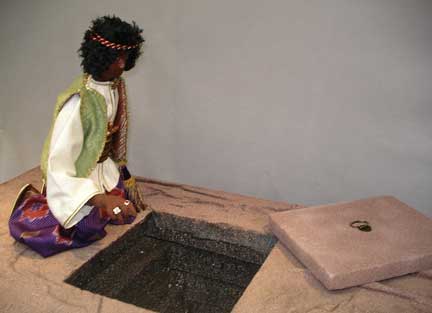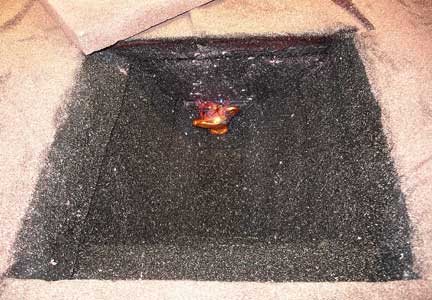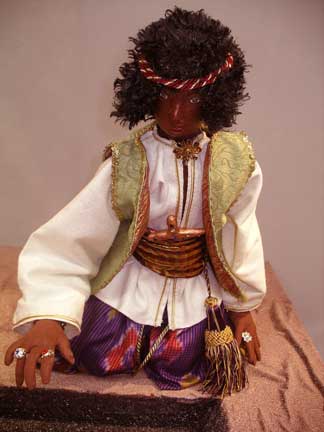FiberAlchemy.com
Aladdin and the Lamp/Allauddin (Nobility of the Path) and the Lamp of Divine Light
The tale of Aladdin and his lamp first became widely known in the 19th century when Richard Burton told a version of it in The Arabian Nights. According to the tale, Aladdin/Allauddin is a lazy Chinese boy (I suppose China was exotic to Middle Easterners) whose father has died of grief because of his laziness and uselessness. A magician visits Aladdin and his poor mother; he poses as his uncle and lures him to the countryside. He gives him a ring, recites a magic spell, and has him descend into a cave in the earth through an opening that suddenly appears. Here, in a garden filled with fruit trees, Aladdin/Allauddin finds an oil lamp, which he is to give to his “uncle.” Aladdin may be lazy but he is no fool; he refuses to give up the lamp until the magician helps him out of the cave. The magician becomes furious and magically closes the cave entrance. Aladdin is trapped for several days, until he accidentally rubs the magic ring and a genie (related to the Arabic jinn) appears and does his bidding.
Later, Aladdin/Allauddin’s mother decides to polish the lamp and a fearsome genie appears. She faints. Aladdin/Allauddin, more experienced in these matters, reclaims the lamp and commands the genie to grant him his wishes for enough to eat and live moderately. When he sees the princess of the realm, however, he falls instantly in love and suddenly desires much more—enough wealth and wit to wed her. Various events happen and he does, indeed, wed her.
Later, Aladdin/Allauddin has a reversal in fortune: the princess foolishly gives the lamp away to the magician, who is disguised as a lamp vendor advertising “New lamps for old!” Suddenly everything Aladdin/Allauddin has—the palace, the princess—disappears in a moment. All is not lost, however, because Aladdin/Allauddin still has the magic ring. After various convoluted events, Aladdin/Allauddin reclaims the lamp, the princess, and his fortune.
Various interpretations of the story are that it is a classic example of wish fulfillment, or that it describes masturbation. However, I suddenly saw hidden within it a very different story: Aladdin is Allauddin, a name that means “Nobility of the Path.” Why should he have such a name? What can be “brought to light” in this story by rubbing the lamp? The light within.
There is an important clue in the story: the lamp is hidden in the earth, deep within, perhaps in the subconscious—it is found in an underground cavern filled with fruit trees…. This lamp is the Divine Light shining in the heart, often covered with the dross of forgetfulness, the dinginess of ego, materialism, and attachment. Think for a moment: what is usually found in a lamp? A genie/jinn? In another tale a genie is found in a bottle—but not a lamp. A lamp is where we find light.
There is a Sufi saying about “polishing the mirror of the heart.” I suggest that in this story we polish the lamp, instead of the heart…. We learn that material possessions, and the one we love, can disappear in a moment. The only thing that is constant is the power of the Light Within.
The story also reminds us of the transformative power of love. Until Aladdin/Allauddin fell in love, he was content to just “get by.” Material possessions didn’t really interest him in themselves. But when love smote him, he become quite ingenious in fulfilling his desire. When his beloved suddenly disappeared, he become equally intent on recovering her.
Clearly this is a story about the transformative power of love and spiritual development.
Questions occur: How do you polish the mirror of your heart? How do you call upon the Inner Light, the Divine Light hidden within each of us? What covers up this light within? What motivates you? Is it love? Desire? Material possessions? What lies hidden within you that, when brought to consciousness, will fill the world with light?


